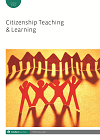- Home
- A-Z Publications
- Citizenship Teaching & Learning
- Previous Issues
- Volume 13, Issue 3, 2018
Citizenship Teaching & Learning - Volume 13, Issue 3, 2018
Volume 13, Issue 3, 2018
-
-
We, the non-global citizens: Reflections on the possibilities and challenges of democratic global citizenship education in higher education contexts
More LessBy Edda SantAbstractThis article examines the possibilities and challenges of democratic global citizenship education (GCE) in higher education (HE) contexts. The article contrasts liberal, post-structuralist and postcolonialist theory with data deriving from a small empirical ethnographic project. A small group of undergraduate students studying education met weekly for a period of three months. Data were collected through field notes, course work and participants’ diaries. Results suggest that the global citizensubject, for these participants, is conceptualized as the cosmopolitan elites who do not identify themselves as national citizens. Global citizenship is constructed as an identity that students initially do not hold but aspire to gain. These findings pose some questions to democratic approaches to GCE.
-
-
-
Lone heroes, outsiders, rebels and social ecologies: Insights from three case studies of young citizens in action
More LessAuthors: Lucas L. Walsh and Rosalyn BlackAbstractYoung people are frequently constructed in education policy discourses as not only active but transformative citizens who are expected to produce social and/or political change. Young people may embrace the individualized image of the active citizen while feeling the pressure of working within established structures and systems and of navigating the deficit discourses of youth that sometimes attend these. They may also acknowledge the role of key organizations and mentors in shaping their capacity to influence change, and yet still see themselves to some degree as lone hero actors, even as outsiders or rebels. This article draws on three Australian case studies to consider the role of NGOs and local government organizations in supporting young people’s capacity to influence change. It considers the importance of what we have called the social ecologies of influence, their relational and geographic dimensions, and how they enable young people’s resilience and efficacy as active citizens.
-
-
-
Examining civic education pedagogies from a sociocultural curricular perspective: Lessons from three Israeli classrooms
More LessBy Aviv CohenAbstractResearch on pedagogical aspects of civic education is a field of study that deserves further exploration and scrutiny. This study focused on the examination of pedagogical practices enacted in three Israeli civics classrooms, in which an identical curriculum was taught. Classroom observations, teacher interviews and text analysis point to how despite similarities, each case presented different teaching activities and practices, framing and influencing the citizenship conceptions promoted in each case. These findings shed light on how pedagogy interplays with content while relating to contextual factors, determining and limiting the very notions of citizenship promoted in each case.
-
-
-
Student council and student leadership training in Hong Kong primary schools
More LessAuthors: Eric King-Man Chong, Yuen Wai Wa Timothy and Leung Yan WingAbstractThis article demonstrates how a Hong Kong primary school enlists students (aged 6 to 12 years) in school governance by having a student council and by creating a supportive learning context, including building a supportive ethos and offering training for student leaders. The significance of this study lies in its reporting of a successful case of a student council in a primary school and the impacts on the civic qualities of the students involved. This is an attempt at investigating: the educational impacts of a student council in a primary school setting in a Chinese context; and the collaboration between schools, teachers and a service provider in nurturing a school ethos and context favourable for student engagement. This study argues that although primary school students are young, they are able to speak up and act as office bearers in a student council in an effective way. They can contribute towards school governance by conveying informed views on school matters. A supportive school context consisting of favourable attitudes taken up by school parties, namely the school governing board, principal, teachers and students, is crucial. Hopefully, the study can shed light to the international communities on the nurturing of citizens through active participation in school community at an early age to have the competence to know, think, act, reflect and care in a new political environment marked by uncertainty and increasing political polarization.
-
-
-
Action civics education and civic outcomes for urban youth: An evaluation of the impact of Generation Citizen
More LessAbstractIn action civics education, an emerging promising practice, students learn civics through taking action on a community issue of interest. We examine the action civics programme Generation Citizen (GC) using quantitative and qualitative student survey data. Our quantitative analyses used a quasi-experimental study design and a multilevel model. Participation in GC was associated with increased action civics knowledge, and there were some variations in impact by programme and classroom characteristics. We also qualitatively analysed students’ short reflections upon programme completion and found that students feel more prepared for civic action. Action civics shows promise for improving student civic outcomes, but more research, including longitudinal follow-up, is needed. Given the variations in impact that we observed, action civics practitioners should carefully choose the implementation setting.
-
-
-
Reviews
More LessAuthors: Susan A. Adler, Sicong Chen and Alan SearsAbstractCIVICS AND CITIZENSHIP EDUCATION IN AUSTRALIA, ANDREW PETERSON AND LIBBY TUDBALL (EDS) (2017) London, Oxford, New York, New Delhi, Sydney: Bloomsbury Academic, 281 pp., ISBN 9781474248198, hb, $148 USD.
International Mobility and Educational Desire: Chinese Foreign Talent Students in Singapore, PEIDONG YANG (2016) New York: Palgrave Macmillan, xiii+136 pp., ISBN 978-1-13759-142-5, h/bk, £37.99
Anxious Politics: Democratic Citizenship in a Threatenin g World, BETHANY ALBERTSON AND SHANA KUSHNER GADARIAN (EDS) (2015) New York: Cambridge University Press, 247 pp., ISBN-13: 978-1-31641-665-5, p/bk, CAD$35.95
-
Most Read This Month


